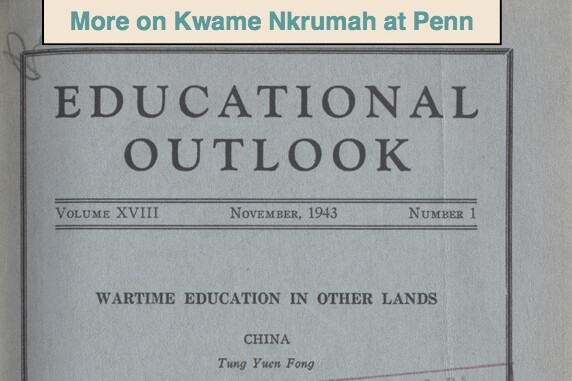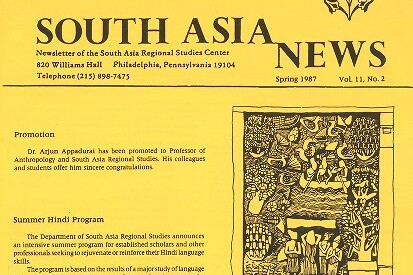Educators from nine or ten Latin-American countries visited Penn to study the city's educational system. The guests were honored at the weekly luncheon of the Pan-American Association at Penn, and attended the Philadelphia Workshop on Teacher-Education sponsored by the Board of Education, Temple and Penn.
Timeline
Diversity milestones from throughout Penn's history

Penn was highlighted in a Philadelphia newspaper for teaching four African languages: Moroccan Arabic, Fanti, Swahili and Hausa by native Africans Abdul Kader Larbi, Francis Nkrumah, Joseph Lengo, Abdu Hassan. The program, in light of a wartime need for enhanced knowledge on Africa, was headed by the newly created Institute of African Studies and financed by the American Council of Learned Societies. Penn students were taught at the University Museum on 33rd and Spruce with the goal of eventually being able to instruct others. In addition to African languages, Dean of the College Dr. John M. Fogg, Jr. examined what Africans ate, Dr. Herbert Liebesny focused on colonial law and Dr. Edwin R. Helwig compiled data on animal life. "It's a continent-wide research effort, in the spirit of these days of global war" said Dr. George C. Vallant, director of the museum. Dr. Wieschhoff, curator of the African section of the museum and one of the founders of the Institute of African Studies noted Americans were far behind Germany with respect to understanding African language and culture. On the same topic, but from a separate article, Dr. Zellig Harris remarked, "Penn is the only place in the country where serious teaching of African studies is available."
The International Student House separated from the Christian Association, re-named the International House of Philadelphia; it was the first of its kind in the United States and a model for future institutions around the country.
President Dr. Thomas S. Gates announced the creation of a committee on African Studies, headed by Dean of the College and Associate Professor of Botany Dr. John M. Fogg, Jr. The committee was to expand on work already completed in the field by various divisions within the University.
The Hillel Foundation is established on 3613 Locust St. to succeed the Louis Marshall Society as the Jewish student organization at Penn.

Penn created the South Asia Regional Studies Department. A news release announced a $1 million grant from the Ford Foundation and stated "The program at Pennsylvania was the first language and area program inthe United States dealing with South Asia or any part of south Asia, according to authorities at the University. Further, the program probably has attracted a greater number of students and has conferred more degrees for graduate study than any other program in America which is concerned solely with the South Asia area."
The University conferred an honorary LL.D. to Ralph Bunche at the annual Commencement ceremony. Bunche was the first African American to receive an honorary degree from Penn.